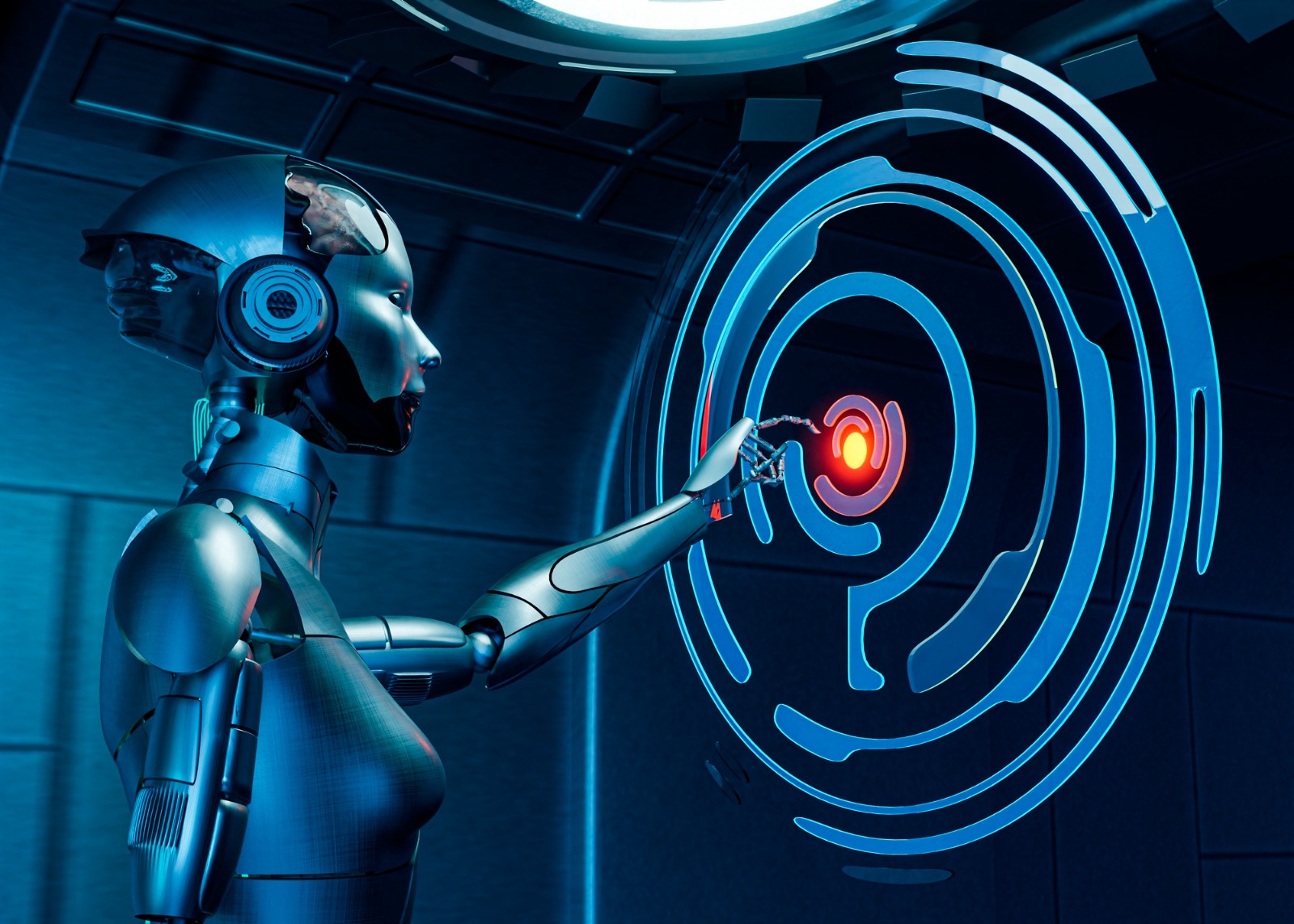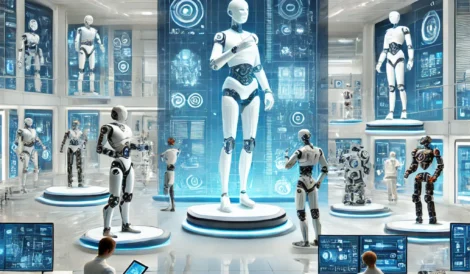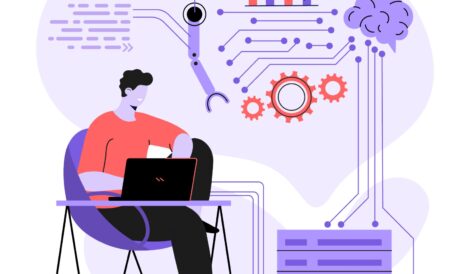admin
- Posted on
- No Comments

Artificial Intelligence (AI) is driving the present and future of technology. It’s fascinating to see how AI is becoming a part of our everyday lives. Did you know that 35% of businesses are already using AI in some capacity? Even more impressive, 77% of the devices we use today incorporate AI in some form. In this blog, we’ll chat about where AI is headed and what that means for us all. Let’s get into the exciting possibilities of artificial intelligence together.
What is Artificial Intelligence (AI)?
Artificial Intelligence, or AI, is a branch of computer science focused on creating machines that can perform tasks typically requiring human intelligence. These tasks include understanding, reasoning, perception, interpreting natural language, and making decisions.
AI systems are generally categorised into two types: Narrow AI and General AI.
- Narrow AI, also known as weak AI, is designed and trained for a specific task such as speech recognition, image recognition, or playing chess. It’s the type of AI we’re most familiar with today.
- General AI, also called Strong AI or Artificial General Intelligence (AGI), represents a more advanced form of AI. This type would be capable of understanding, learning, and applying knowledge in a way that mimics human abilities.
While we currently operate with narrow AI, achieving general AI remains a challenging and ongoing area of research for scientists.
How AI Has Transformed Over Time
The idea of creating machines that can think like humans really took off in the mid-20th century. Back then, the hype around AI was huge. The game-changing moment came in 1956 at the Dartmouth Conference, organised by AI pioneers John McCarthy, Marvin Minsky, Nathaniel Rochester, and Claude Shannon. This event officially coined the term “Artificial Intelligence.”
In those early days, AI research focused on problem-solving and symbolic methods. Some notable milestones include the Logic Theorist in 1955 by Allen Newell and Herbert A. Simon, and the General Problem Solver in 1957.
The main goal? To build systems that could perform tasks like playing chess or proving mathematical theorems.
Fast forward to the 1980s, and we see the increase of expert systems. These were created to mimic the decision-making skills of human experts. However, they had their limitations, often being quite narrow in scope and lacking flexibility.
The real game-changer came in the 21st century with the advent of machine learning, especially deep learning. By harnessing massive amounts of data and powerful computational resources, we started training models that could handle a wide range of tasks effectively.
Some standout moments include IBM’s Deep Blue defeating chess champion Garry Kasparov in 1997, and Google’s AlphaGo beating a world champion Go player in 2016. These achievements highlight just how far AI has come and hint at the exciting future ahead.
The Future of AI in the Next Decade?
Looking ahead, AI is set to become an even bigger part of our lives, enhancing technology and improving our quality of life. Even writing a blog post like this is not a difficult task, with the right prompt and input. One of the most exciting developments is the potential rise of general AI. This type of AI would have a human-like understanding and be able to tackle problems across various fields.
Imagine systems that learn quickly, adapt easily, and don’t need extensive data labelling or complex training. They’ll make complex decisions, interact with us better, and even understand our emotions and communication tones.
Redefining Possibilities with Advancements in AI
Standing at the crossroads of this era, it is indispensable to grasp the future perspective of artificial intelligence and the profits of mastering the technology. AI development is not just about rethinking the impossible.
Still, the creation of a world with smart machines improving human abilities while addressing global issues that defy solutions in other ways, such as the field of Health care as well as the Banking sector, among others, including Transport systems and Educational systems
AI’s potential to drive innovation and improve efficiency is boundless. Let us look into it more detailed:
Healthcare:
- AI-driven Diagnostics: AI is going to improve diagnostic accuracy through advanced imaging analysis and pattern recognition that will make it possible for diseases to be detected earlier as well as treated in time.
- Personalised Medicine: AI is expected to come up with personalised treatment plans based on an individual’s genetic makeup or health record, which will help them heal better.
- Patient Monitoring: With continuous AI-powered monitoring systems, patients will have their current health records, which will help in managing them better and preventing some of the conditions.
Finance:
- Risk estimation and finding fraud activities: The AI algorithms check enormous quantities of data to pinpoint possible threats, as well as scrutinise potential fraudulent activities with more accuracy.
- Tailored financial services : AI will propose investment strategies tailored to personal financial behaviours and desired goals.
- Trade automation: AI-driven trading platforms will make the market more effective and conduct transactions when gains are at peak.
Transportation:
- Autonomous Vehicles: AI enables self-driving cars, which minimise accidents related to human errors and increase the effectiveness of transport services.
- Traffic Management: Using artificial intelligence systems helps to alleviate road congestion as well as optimise traffic flow due to continuous analysis of live traffic data and prediction.
- Logistics Optimization: Employing AI accelerates supply chain functions, leading to faster deliveries and lower expenses, by applying forecasting techniques.
Education:
- Personalised Learning: AI-powered platforms adjust the educational content to match various learning styles, causing students to engage more and comprehend complex ideas better.
- Artificial Intelligence-Driven Tutoring: Students will get tailored comments as well as real-time online help from virtual tutors who use AI.
- Administrative Efficiency: AI will help to automate tasks and increase administrative efficiency, freeing up teachers to focus more on engaging and instructing students.
Entertainment
- Content Creation: AI can help produce music, art, and written content, among other creative works. In other words, it can unlock new possibilities for expression and creativity.
- Personalised Recommendations: AI can make entertainment much more exciting by tuning it to individual preferences.
Security
- Cybersecurity: AI is already being used to protect digital infrastructures and systems by proactively identifying and addressing security threats.
- Surveillance: AI-powered surveillance systems can revolutionise the way crime is managed by enhancing public safety through identification and anticipation.
Exploring Career Options of Artificial Intelligence
In the AI arena, there are many paths through which one can find a position. Depending on the industry one works in, AI presents a very possible job market. Different roles that come with AI expertise include researching, developing, deploying, or managing AI systems. Here are some key careers and roles in AI:
- AI Research Scientist
- Machine Learning Engineer
- Data Scientist
- AI Software Developer
- Robotics Engineer
- Natural Language Processing (NLP) Engineer
- Computer Vision Engineer
- AI Ethicist
- AI Product Manager
- AI Consultant
Skills Required for a Career in AI
- Mathematics and Statistics: Knowledge of linear algebra, calculus, probability, and statistics.
- Programming: Fluency in programming languages like Python, R, or even C++.
- Machine Learning: Understanding different machine learning algorithms along with the approaches (TensorFlow, PyTorch).
- Data Handling: The ability to process data in easier and uncomplicated ways; analyzing huge amounts of unstructured data that often come as a result of different file types; and creating ways that depict data in a simplified manner using graphical representations, for example, charts or graphs.
- Domain Knowledge: Knowledge about a specific domain is one of the essential tools necessary for decision-making in the AI world.
- Prob Solving: The capability of dealing with intricate issues and inventing original ideas on the way out
- Communication: The faculties to articulate AI principles or discover and share information with non-IT colleagues.
There are numerous chances available in the rapidly changing field of Artificial intelligence to those who have suitable skills and interests. Enrolling in an AI course can open your door of amazing career opportunities.
Study At Netcom Academy
Learning AI course through Netcom Academy comes with loads of benefits,
Discover why Netcom Academy is the best choice for AI courses and join our community of learners and innovators today! Contact us now.



